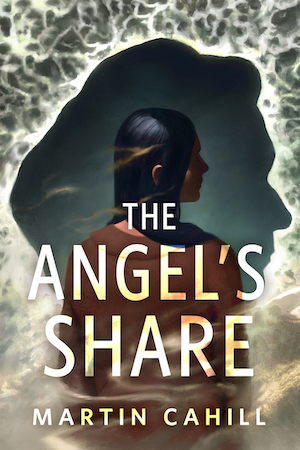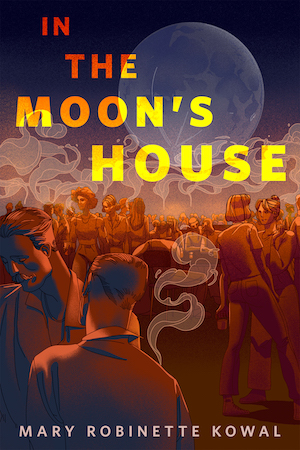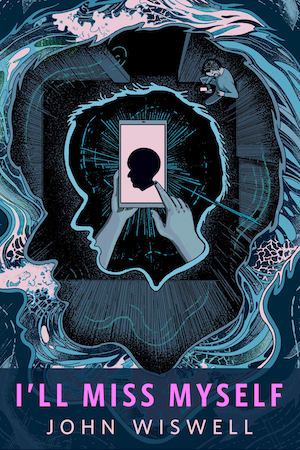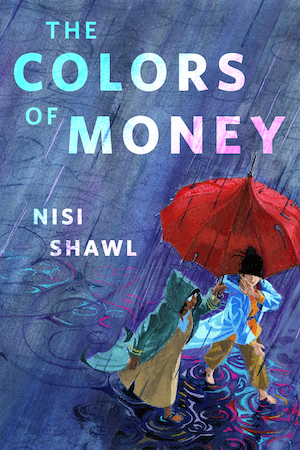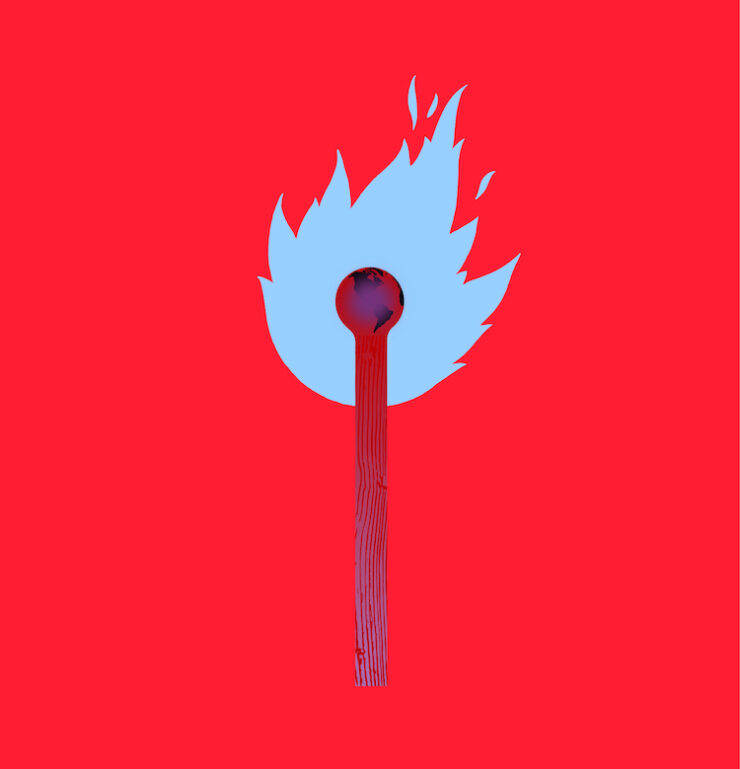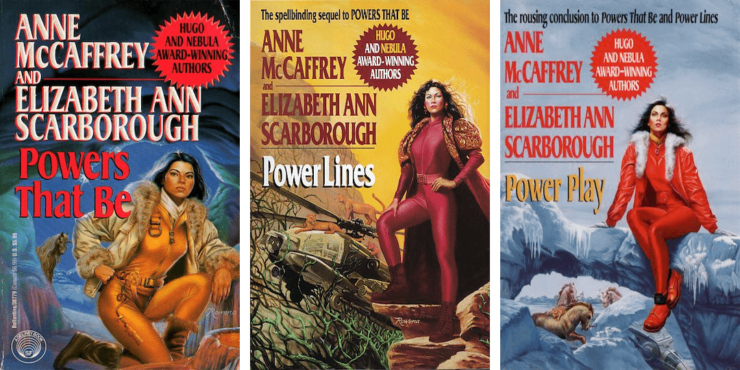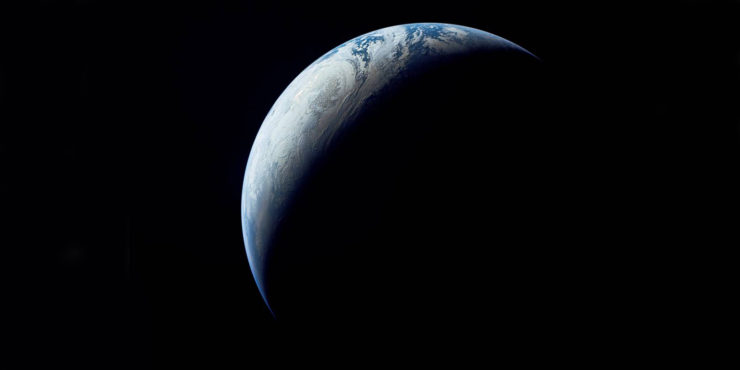A contentious election and radicalized locals interfere with Canadian recovery workers’ efforts at the site of a catastrophic flood in near-future Mississippi.
This story is set in the same future as The Lost Cause, Cory Doctorow’s new novel, available everywhere on November 14, 2023.
Look for the helpers. You will always find people who are helping.
—Fred Rogers (1986)
It’s a treat to beat your feet on the Mississippi Mud.
—Bing Crosby (1927)
I arrived in Oxford with the first wave of Blue Helmets, choppered in along with our gear, touching down on a hospital roof, both so that our doctors and nurses could get straight to work, and because it was one of the few buildings left with a helipad and backup generators and its own water filtration.
Humping my bag down the stairs to the waterlogged ground levels was a nightmare, even by Calgary standards. People lay on the stairs, sick and injured, and navigating them without stepping on them was like an endless nightmare of near-falls and weak moans from people too weak to curse me. I met a nurse halfway down and she took my bag from me and set it down on the landing and gave me a warm hug. “Welcome,” she said, and looked deep into my eyes. We were both young and both women but she was Black and American and I was white and Canadian. I came from a country where, for the first time in a hundred years, there was a generation that wasn’t terrified of the future. She came from a country where everybody knew they had no future.
I hugged her back and she told me my lips were cracked and ordered me to drink water and watched me do it. “This lady’s with the Canadians. They came to help,” she said to her patients on the stairs. Some of them smiled and murmured at me. Others just stared at the backs of their eyelids, reliving their traumas or tracing the contours of their pain.
“I’m Alisha,” I said.
“Elnora,” she said. She was taller than me and had to bend a little to whisper in my ear. “You take care of yourself, okay? You go out there trying to help everyone who needs it, you’re going to need help, too. I’ve seen it.”
“I’ve seen it, too,” I said. “Thank you. I hope you don’t mind if I give you the same advice.”
She made a comical angry face and then smiled. She looked exhausted. “That’s all right, I probably need to hear it.”
My fellow Blue Helmets had been squeezing past us, trudging down the staircase with their own bags. I shouldered mine and joined them. Elnora waved at me as I left, then bent to her next patient.
I stepped out into the wet, heavy air of the Mississippi afternoon, the languid breeze scented with sewage, rot, and smoke. My clothes were immediately saturated with water sucked out of the ambient humidity, and I could feel myself pitting out. Squinting, fumbling for my sunglasses, it took me a moment to spot the group of angry men standing by the hospital entrance. Red hats, open-carry AR-15s. It was the local Maga Club. On closer inspection, a few of them were women, and while they skewed older, there was a smattering of young adults, and, heartbreakingly, a good number of small kids, holding signs demanding foreign agitators out of mississippi!
Bekka, a Cree woman from Saskatchewan who’d been my seat buddy on the helicopter ride, leaned in. “Straight outta central casting.”
At first, I thought she was right. Weather-beaten, white, unhealthy in that way poor Americans are, lacking access to basic preventative care. They looked so angry. Plus, the guns. But there was something else there, and I couldn’t put my finger on it until I spotted a sign being held aloft by a heavyset, middle-aged guy with wraparound shades and a sweat-sheened face: our lives matter too.
I knew he meant it in a gross way, but I couldn’t argue with it.
I had plenty of flood experience, thanks to my year in Calgary. I could fill sandbags, site and service pumps, work the levees, install reverse-osmosis filters, dig WHO-standard latrines, and efficiently store and track emergency rations. I was good at comforting survivors, especially other women, who had often lost children. I’d never had children and I kept telling people I never would, but it turned out that there was something about the experience of a lost child that I could relate to.
I had also pulled bodies out of the water, almost all dead, but two living ones. One of those two was still alive, but the last time I’d video-conferenced with her, she’d clutched her soft toy and cried for her parents the whole time. No one ever found her parents, not even their bodies. That happened to a lot of people, even with the DNA stuff from the last quarantine lockdown. I was better at consoling parents with dead kids than kids with dead parents.
Mississippi was the same but different. Calgarians were traumatized but determined. They knew there was a better future ahead of them, and only sorrowed that it hadn’t arrived fast enough. The new Calgary—on higher ground, out of the floodplain, fed by wind power, dense and vertical to preserve natural habitats that sprawl had been ceaselessly devouring—was springing into existence now, thanks to that furious energy. They wanted their future and they weren’t waiting for it. They were taking it.
Mississippi was . . . beaten. The university had been starved of funds for so long, becoming more and more dependent on the whims of individual donors, dilettantes with pet theories they expected to see taught. Ole Miss became such a joke that a group of grads had sued the regents unsuccessfully for lowering the value of their degrees. They lost early without a chance to make any substantive arguments, thanks to the binding arbitration clauses they’d signed on enrollment.
The music scene went next, with Ticketmaster/LiveNation buying and then shuttering the Lyric, then working its way through the college clubs, squeezing them for every dime and dropping them. Even the barbecue joints had been scooped up by a private equity fund, merged into a single corporate unit, and then turned into self-parody.
And at every step, the city and the state had either failed to stop Oxford’s dismantling, or worse, had participated in it. No one believed help would come. There was such helplessness, a sense that everyone knew what had to be done and that no one would ever do it.
At least they had the elections to distract them. Everyone had election fever. The eight state lawmakers who’d died when their motorcade was caught in a mudslide had all been lifers, five-termers, eight-termers, a twelve-termer. Also: all climate deniers. The Blue Helmets whispered jokes about science progressing eight funerals at a time, and I was appalled, but then they told me they’d first heard ’em from locals while out on pet rescue, scooping up skinny, shivering cats and dogs the drones had picked out. It was a good detail. Pets were grateful to be rescued and drones were good at distinguishing them from flood slurry and rubble. Something to do with all the cat and dog videos on social media providing endless training data.
The Blue Helmets always worked with local partners. That was our hard-and-fast rule: if there weren’t locals onsite, we couldn’t be onsite, either. We wanted to help, but that help had to be with locals, not for locals. If they didn’t buy in, we couldn’t be effective, and if we went ahead and did the work anyway, we’d burn the credibility we needed to do our jobs effectively.
So the snap elections were . . . a challenge. The Republican-controlled state house had made a calculation that if they held the elections during the chaos, poor people would be too distracted and traumatized to vote, letting them fill those eight seats again. They didn’t want a repeat of Texas.
But Texas sure did. The same national organization of Dealers who’d organized the largest voter turnout and the biggest political upset in a century were committed to flipping Mississippi next.
The national volunteers and their Texas vanguard who descended on Mississippi to mix voter registration with relief efforts muddied our mission, and we muddied theirs. Maga Clubs never cared about truthfulness and nuance under the best of circumstances, and in the chaos of the flood relief, it was easy for them to conflate “foreign aid workers” and “outside political organizers” and come up with “foreign interference in a US election.” These were the six scariest words in the American phrasebook, words to conjure up a bipartisan QAnon/BlueAnon horde.
This made it extra hard for us to do our jobs. We couldn’t deploy unless we were matched with a Mississippi team. The Maga-aligned teams wouldn’t work with us, and the other teams kept disappearing into election-campaigning outings that we stayed the hell away from. There were days when we felt like tools that had been forgotten at the back of the shed.
“Remember,” Bekka told me, after she’d skunked me at Set for the eighth time, “we’re here to be part of their thing, not to do our thing. If you’re here for the egoboo, you’re gonna be disappointed.”
I looked down at the final seven unmatchable Set cards and my pathetic pile of sets and sighed. “I know.”
“I know you know, but it doesn’t hurt to remind you.” Bekka had a scar just to the left of her mouth, where something bad had happened. She never talked about it, but she touched it when she was drinking, sometimes, and got an angry look. When she smiled, like now, it was like an extra-special dimple.
“Let’s go get a drink,” she said.
We were stationed outside of Oxford, in an exurb that had been starved when the state cut its transit links to the city, where the only local employer was a gig warehouse that served as a regional distribution center for a bunch of second-tier e-commerce platforms that couldn’t afford Amazon robots, not with Mississippi work going as cheap as it did.
The warehouse had been hit hard by the flood, and since the railroad tracks were still impassable, no one’s apps were sending them hours. A few trucks came in or drove out with goods, but almost everything had shut down.
We set out on our bikes—fat-tired things with heavy locks and big mud guards over the chains and tires—and pedaled down what was left of the main street, looking for something to do. We heard the party before we saw it, that EDM-meets-Delta-blues that was the sound of the summer everywhere in Mississippi
We homed in on the beats and before we knew it, we were outside a low-slung goods warehouse on a rail spur, with a huge crowd outside of it, barbecuing on kettle grills and making blender drinks at a bar next to a noisy generator that was also pumping out the tunes.
I recognized Elnora a second before she recognized me and she broke off her conversation, snatched a red party cup out of the hand of a bartender who’d just filled it up, and jogged over to me, a million-dollar smile on her face.
“Hey, Canadian girl!”
“It’s Alisha,” I said. “And this is Bekka.” Bekka dismounted and shook Elnora’s hand, then Elnora handed me the cup. It was cold and filled with some kind of boozy frozen slurry.
“It’s a Mississippi Mudslide,” she said. “That reefer car there’s run out of battery and the freezers in the warehouse have been out all week, so that ice cream’s gotta get eaten up.”
I took a sip. I preferred my booze on the dry side, but the mix of chocolate ice cream and bourbon was certainly refreshing. I didn’t offer Bekka a sip—we’d had all our sharing habits beaten out of us years before, in Calgary, during the bad Beaver Fever outbreak—but Elnora’s bartender had already set one up for her. The party cup—one of the cornstarch ones that had a tendency to disintegrate if you didn’t gulp your drink fast enough—was already beading with condensation.
“I can’t believe we’re drinking Mississippi Mudslides,” Bekka said.
Elnora’s grin was tiny and tight. “We gotta get our bright moments where we can. Bartender over there was warehouse security until last week. They forgot to revoke his lock credentials. Life gives you SARS, you make sarsaparilla.”
“Can’t argue with that,” Bekka said, and drank so much she gave herself brain-freeze.
“How are things at the hospital?” I had been out there the day before, working on the generators and then on the pumps and then the water purifier, in one of those days when everything I fixed revealed something else that was broken.
“Oh, it’s your basic waking nightmare,” Elnora said. That small smile again, and a tight voice. “Been sleeping there, pulling double shifts all week. This is my first day off since—” She did some math in her head. “God, ten days.” I realized she was swaying.
“Remember the advice you gave me when we arrived? That goes for you, too. You can’t be a good nurse if you haven’t had any sleep or a decent meal.”
She slumped. “You’re right. But all the time I’m on shift, all I can think about is what’s going on outside. Soon as I get outside, all I can think about is what’s going on in the hospital. It doesn’t help that every minute I’m inside my screen is blowing up with messages about the election, and soon as I get to one of these things, it’s nonstop messages about the patients.” She made a cross-eyed funny face, but I could see she was really in pain.
“I know that feeling. We get it, too. Plus we get all the craziness of not being able to get out and help because everyone’s out doing election stuff.”
She waved her hand dismissively. “That shit’s so stupid. Who cares if Canadians are pulling your car out the mud without an American chaperone. It’s not like you’re programming the voting machines.”
“I agree, but it’s above my pay grade.”
“Mine, too.” She looked over at the bar where there was another Mississippi Mudslide waiting for her in the hand of a handsome, smooth bartender with a shaved head and a neat little mustache and a million-dollar smile. She took it from him and gulped some. “Damn. Okay, you convinced me. One—maybe two—more drinks and I’ll go home. Keep me company here until I go?”
I looked at Bekka, who’d been bemusedly following our conversation. She looked around dramatically at the dancing people, the amazing music, the frosty drinks. “I don’t know, Alisha,” she said. “We got a lot of Netflix to catch up on back in the tent.” But smiling when she said it.
So we danced. We drank. We drank more than two. The sun was down and the ice cream was gone before we stopped. Elnora leaned against the side of the reefer truck, looking tired and exhilarated at the same time.
“Okay, now will you go home and get some sleep?” I said.
She smiled. “I will, but not straight home. We’re canvassing now.”
I should have put it together before that, but I just hadn’t been paying attention. It wasn’t unusual to see people with Dealer pins or hats, after all, and you couldn’t move in Mississippi for hitting an election sign, but as I looked around slowly I realized they were all wearing the pins and the signs were everywhere.
I found Bekka. “This is an election-campaign party,” I hissed.
“Uh-huh,” she said. “Just figured that out, did you?”
I felt a horrible, sinking feeling, all that ice cream and bourbon congealing in my guts. “Bekka, shit—”
“It’s okay,” she said. “We’re just hanging out—we’re not painting signs or going door-to-door or—”
“Bekka!” Now the ice cream was burning its way back up my gorge. This was our one, die-hard rule. No politics. Ever. Ever.
“I gotta go.” I heard Bekka making excuses to Elnora as I unlocked my bike and mounted up. She caught up with me on the washboard road a few minutes later, pedaling hard, her headlight sending my shadow shooting out ahead of me as she came up behind me.
“Alisha, you need to calm down, girl.”
“Bekka, this is serious. I mean, maybe we got away with it, but this could blow the whole op. Jesus, Bekka, how could you let me—”
She cut me off and I slammed the brakes. “First of all, I didn’t ‘let you’ do anything because you are a grown-ass woman. Second of all, I assumed you’d figured it out, same as me. Third of all, yeah, I support the GNDs, of course I do—they’re the only people here that even pretend to care about indigenous justice, about people of color. That’s not just a theoretical problem for me, it’s personal, do you understand? You’re Canadian, I get that, but I come from Road Allowance Métis, and my ancestors never signed a treaty. Our lands don’t stop at the border. This is my country, just as much or as little as Canada is. So don’t you presume tell me what I can do here, lady.”
Fury and shame warred in me. I felt the tears prick at my eyes, and sweat coursed down my back. I wiped my eyes with my shirttail, and the tiniest of breezes cooled my stomach and back off to an infinitesimal degree. “Bekka, I’m sorry. You’re right. What you do is your business. But I didn’t realize until right at the end there what they were doing, what we were doing—”
She softened. “I believe you. If I’d understood that, I would have said something. I know you take this seriously. But do you honestly think you’re the only Blue Helmet that’s doing this? Do you think people who care enough about these people and this planet to come down here don’t care enough to help them elect leaders who’ll keep them from torching the world?”
I felt a wave of vertigo. “Bekka, come on, that’s not true. I mean, maybe some of our people are partying with the politicals or—”
“Girl, you are blind. Half of us are ringing doorbells with them. Putting up signs. Registering voters. You think this is a game with rules? It’s a fight for their lives and our lives, too.”
I was suddenly furious. “Of course it’s not a game. Bekka, it’s deadly serious.” My voice was trembling. I was trembling. “That’s why I take it seriously. If we’re going to be able to do this work in the future, we can’t get turned into a political talking point. We have to be neutral—”
“See, you say you don’t think it’s a game, but that’s not being serious, Alisha. If they elect another legislature full of sociopath deniers, we won’t be able to do this work in the future because there won’t be any future.”
I wanted to slap her. I had never slapped anyone, but oh my God did I want to slap her. I got on my bike and pedaled home instead.
I woke up sticky and hot, as usual. Hungover, too, which was less usual. Ice cream hangovers are the worst, with that pasty full-mouth pucker from too much sugar. My cot was already soaked with sweat. I realized I’d slept in—way in. It was high noon. No wonder the old high school whose upper floor we were using as dorms was so hot and muggy.
I needed a shower, so I grabbed my towel, still damp and stinking of mildew despite the silver ions they’d doped all our gear with, and headed to the old girls’ locker room. I was toweling off when I remembered what Bekka had told me the night before, my incredible, all-consuming rage. She had been angry, too, that must have been why she said what she did, just trying to hurt my feelings. Bekka had been through a lot of shit—I mean, we all had, but she’d had some really rough times growing up, and if there was one thing I’d learned, it was that trauma could manifest in all kinds of unpredictable ways.
I’d halfway convinced myself that Bekka had just been raging when I got back to the room to discover her waiting for me.
“Alisha—”
“Bekka, it’s okay. I’m sorry, too. I shouldn’t have freaked out like that. I disagree with your choice, but it’s yours to—”
She cut me off. “Alisha. Shit.” She looked terrible, worse even than I felt. Not just hungover, either. “I’m sorry,” she said. Her voice broke. She handed me her screen.
It took a while for me to figure out what I was looking at. The footage was grainy, taken from a long way off with night scopes, but then the camera zoomed out and I realized it was a video of me, drinking Mississippi Mudslides with Elnora, dancing with her friends, chatting. I cranked up the volume and heard the narrator, a young man, Southern accent, local: “—Canadian so-called relief workers have been working actively with domestic agitator elements to interfere in our election, seen here literally dancing on the graves of our state senators, who the foreigners are hoping to replace with disaster socialists who want to exploit our terrible tragedy to impose their agenda on us.”
The overwhelming dread from the night before was back, but what I saw next actually made me drop the screen: my own photo, ganked from a social media profile, with my name and dox—date of birth, email, social handles—on a chyron beneath it. The voice was still talking, but all I could hear was a roaring in my ears, and that’s when I dropped the screen.
When I picked it up again, I was looking at more night-scope videos of doorbell ringers, blurrycam zooms on the faces of the volunteers, cutting to more social media doxings, my fellow Blue Helmets.
Bekka took the screen out of my nerveless fingers. I realized I was still wearing a towel. Woodenly, I began to dress. I even started putting on makeup, my hand shaking.
“Alisha, I’m sorry.”
My makeup wouldn’t go on right, not with all the tears, and I blotted my face on a T-shirt from the pile on top of my backpack.
“I’m sorry, too, Bekka. I’m sorry that I think this means we just totally, utterly fucked these people over. You know this means they’re going to lose the election, right?”
“You don’t know that. No one knows that.” But from the look on her face, I knew she agreed.
I didn’t even check my screen for jobs. None of us would be out working that day.
They burned a cross on the lawn of the old high school that night. They didn’t even wear hoods. They wore the red hats, and they had signs: foreigners out! stop rigging our elections! There were pictures of me dancing shopped with gravestones.
I was back in Toronto when they announced the Mississippi election results. Bekka and I hadn’t spoken once as we packed up our gear and got our transport assignments. The couple of times when our paths crossed during the bugout, we’d avoided eye contact.
But I’d seen Elnora one more time before I left. She was part of the group—the surprisingly large group—that turned up to thank us and send us on our way. She gave me a really excellent hug and told me to take care of myself and I told her to take care of herself and wished her luck and she wished me luck.
I threw myself into Blue Helmet work when I got back, going into the office to do admin stuff, taking the subway out to Etobicoke to work with the quartermasters on getting gear rehabilitated, inventoried, and back into the field. There were Blue Helmets departing every week, going all over the world, anywhere on fire, anywhere underwater, anywhere people were sick or roasting: Aleppo, Hong Kong, Lesbos, St. Petersburg, Cape Town. But not to America. Not even when lower Manhattan got hit with a storm surge that overwhelmed the seawalls and inundated the MTA tunnels.
The Blue Helmets I worked alongside in Toronto didn’t want to talk to me any more than Bekka did. Our group were pariahs, even if we’d been exonerated by our inspector general. The Canadian Miracle meant that we were the first generation in a century not to fear the future, a nation that was relocating its coastal cities and building high-speed rail at a rate never before seen on the American landmass. We’d been so enthusiastic about exporting our courage and our hope. Now the Americans saw us as ideological fifth columnists, people whose help came with political strings attached. There was word that we would no longer be welcome in Brazil, and whatever progress had been made on a Blue Helmet mission to Mainland China had been squandered. Not back to square one. Back to square minus one million.
They blamed me. I blamed me.
For me, the Canadian Miracle had begun in Dundas Square, on election night, when a combination of disasters (befalling the other parties) and good fortune (for the one party that was willing to face facts) had catapulted the longest of longshots, Brenda Tchimanens, into the prime minister’s seat. Every time I’d walked past the Eaton Centre since, I’d gotten shivers as I remembered the wild elation of that night, the sense that the unbelievable could at last be believed.
So I went back to Dundas Square for the Mississippi election results, and of course it was full of Americans, some of the seven million who’d made it over the border with whatever they could carry as their cities drowned (Miami), burned (LA), or succumbed to mosquito-borne dengue epidemic (Phoenix). They had the refugee look of people who weren’t allowed to work and didn’t know if they ever would be allowed to work, and they watched the show with murmurs and passed-around one-hitters and flasks. You could mistake them for solemn, if you didn’t notice just how jittery they were.
I kept feeling like one of them was going to recognize me and denounce me for destroying the chances that they’d had in Mississippi, call me out as the Blue Helmet who’d danced on the graves of the state’s lost senators.
But no one recognized me, and as the results rolled in, the jitteriness of the crowd turned to excitement, and then elation, a version of what I’d experienced three years before on election night, and we watched as, one at a time, the other candidates conceded, and then we watched the victory speeches from Dealer HQ, and even spotted Elnora dancing in the background of one of them, and then I was dancing, too.
They enacted the state-level Green New Deal on inauguration day, using the same legislative template they’d used in Texas and that they were about to vote on in California, Hawaii, and Minnesota. And, just as in those states, the Maga Clubs brigaded the local jobs-guarantee meetings to secure state funding that put their cross-burning asses on the payroll. It was clear they thought this was hilarious. No one else did. But if cushy government jobs for climate-deniers was the price of saving the planet, it was a small price to pay.
“The Canadian Miracle” copyright © 2023 by Cory Doctorow
Art copyright © 2023 by Will Staehle
Read The Lost Cause, Cory Doctorow’s new novel, available everywhere on November 14, 2023.
Buy the Book
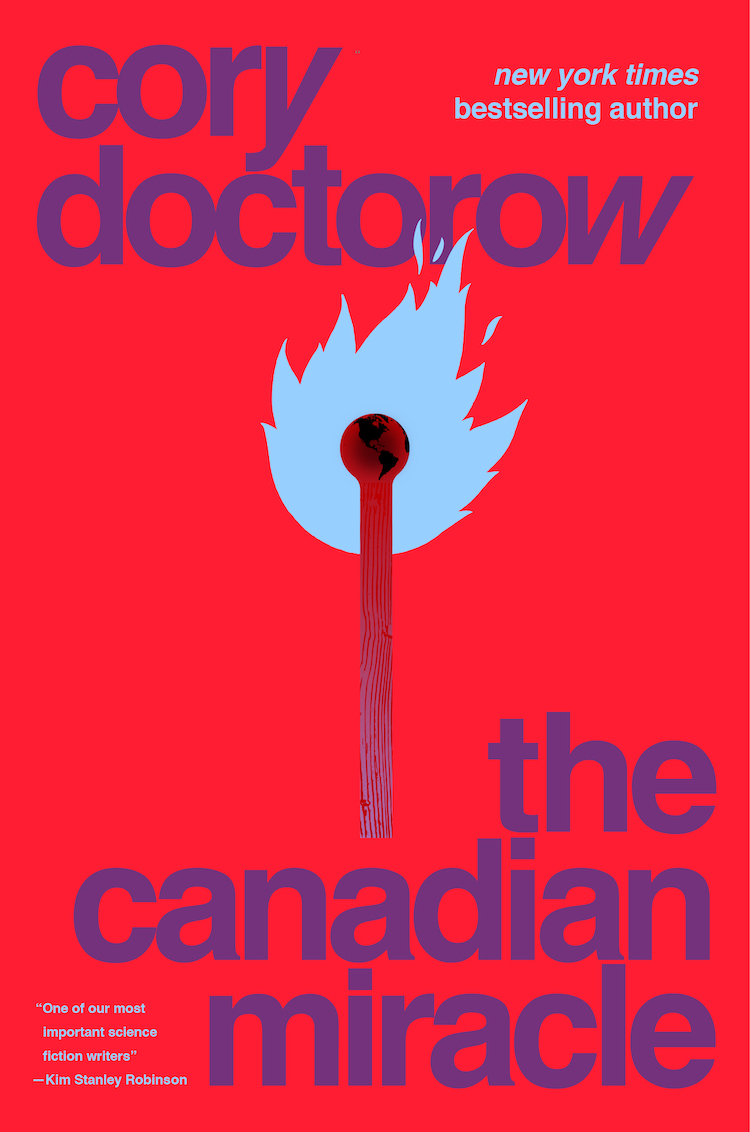

The Canadian Miracle


